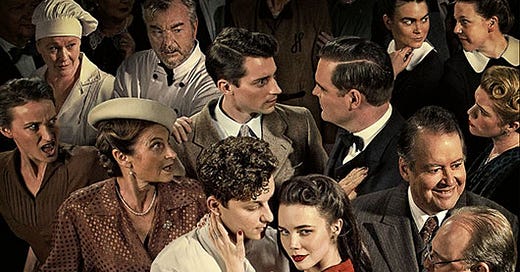My (Kind Of) Swedish Vacation
When you write about politics for a living, sometimes you need a break
You’ve probably noticed that I’ve been absent for a few weeks. Sorry about that.
It wasn’t Lupus that prompted my extended hiatus. I was suffering from an overdose of stupid people, a common affliction for those who write about politics for a living, particularly in this day and age when most of American politics is driven by the dumbest among us.
But since I write about politics for a living, the only option that wouldn’t send me to the poorhouse was to take a vacation from Sweet Merciful Zeus and minimize my time on Twitter.
Yes, I’ve decided to stick with Twitter instead of calling it X. I hate the name X. I’m the same way about KFC. I still call it Kentucky Fried Chicken.
Anyroad.
My method of kicking out the cobwebs is to immerse myself in Scandinavian television. Is that weird?
I mentioned in July that I love watching foreign television shows which, in my opinion, are far superior to American television.
Thanksgiving week, I decided to vacation (sort of) in Sweden. I started by re-watching a couple of Swedish shows I’ve already seen, including “Det Som Göms I Snö” (AKA “The Truth Will Out”).
Then last week, I started the Swedish series “Vår Tid Är Nu,” (AKA “Our Time is Now,” or as it is titled in English, “The Restaurant”).
It’s like the Swedish “Downton Abby.” Instead of taking place at the estate of an English Earl in the 1920s, “The Restaurant” follows the lives of those who work at a posh family-owned restaurant in Stockholm from 1945 until 1971.
In total, there are three full seasons and a fourth mini-season. If you decide to watch “The Restaurant,” I recommend watching the fourth mini-season after watching Season 1 since the mini-season takes place between the first and second seasons.
The story centers on the Löwander family – matriarch Helga and her three children, Gustaf, Peter, and Nina – who jointly own one of Stockholm’s most popular restaurants, Djurgårdskällaren (which they later rename DK, you know, the same way Kentucky Fried Chicken renamed itself KFC).
The series opens with young Nina Löwander taking to the streets to celebrate Germany’s surrender in World War Two. A young man named Calle, who is struggling through the crowd to get to work, stops to kiss Nina before continuing on his way.
As it happened, Calle was on his way to his first day as a chef’s assistant at Djurgårdskällaren, where he and Nina meet again later that night, and romance blossoms.
While the love story between Nina and Calle is a central plot in the series, there is so much more going on. There are characters you will love and those you’ll want to put through a meat grinder, with plenty of conflict, intrigue, humor, and romance in each episode.
The series also features fictional portrayals of real-life people from time to time, including Sweden’s longtime Prime Minister Olof Palme. Also, jazz musician Charlie Parker and rocker Jimi Hendrix are among those who perform at the club Nina opens in the restaurant’s ballroom.
It’s a smartly written series with some excellent performances. The actors who play the same characters over a span of decades are especially impressive, pulling off the age differences seamlessly.
Hedda Stiernstedt is just as good at playing the teenage Nina as she is playing Nina in her forties. Likewise, Charlie Gustafsson made the age transformation of Calle so convincing that by the time we got to the late 1960s, I couldn’t believe he was the same actor.
The Löwander siblings, like the Crawley sisters, don’t always get along. But unlike the Crawleys, their allegiances shift frequently depending on which sibling is trying to screw over the others for control of the restaurant.
None of the characters are flat, two-dimensional cardboard cutouts. That’s what I especially enjoyed about “The Restaurant.” The writers and actors created complex, believable characters who can’t be easily divided between good guys and bad guys or heroes and villains.
Often, I found myself cheering for a character who, just a few episodes earlier, I wanted to punch in the throat.
It’s loads of fun.
The one downside was struggling to read white subtitles during backlit scenes. But other than that, I enjoyed the hell out of “The Restaurant.” I suspect I’ll be watching it again in another month or so.
On Tuesday, I left Sweden for a brief stop in neighboring Finland to watch the Cold War thriller “Nyrkki” (or in English, “Shadow Lines”). So far, I’m enjoying it quite a bit. Then again, I’m a sucker for historical dramas, Soviets, and spies.
Period dramas like “The Restaurant” and “Shadow Lines” are a great way to clear my head of the growing irritation I feel over American politics.
I mean, who wouldn’t prefer great Scandinavian drama over watching the cafeteria-style catfights in Congress, social media engagement farmers’ hot takes, or the media’s obsession with dippy phrases like “person experiencing homelessness?”





